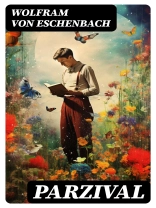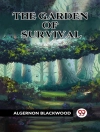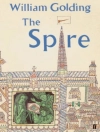Wolfram von Eschenbach’s ‘Parzival’ is a masterful medieval epic that intertwines chivalric romance with profound philosophical inquiry. Written in Middle High German, this narrative presents the quest of the titular hero, Parzival, as he seeks the Holy Grail, a potent symbol of divine grace and human achievement. Eschenbach’s literary style is characterized by its lyrical poetics and intricate characterizations, set against a backdrop of courtly love and moral dilemmas, reflecting the complexities of knightly ideals in the Arthurian tradition. The work does not merely recount adventures; it delves into the internal struggles faced by Parzival, forming a rich tapestry that explores themes of redemption, innocence, and spiritual enlightenment. Wolfram von Eschenbach, a prominent figure of the German medieval literary canon, likely drew on the cultural currents of his time, including the Crusades and the evolving ideals of knighthood, to write ‘Parzival.’ Influenced by earlier legends and the works of his contemporaries, Eschenbach’s portrayal of the hero’s journey resonates with the quest for self-knowledge, manifesting his own wrestling with the moral questions of existence. His nuanced understanding of human nature imbues the text with a timeless quality, appealing to both the medieval audience and modern readers alike. This seminal work is highly recommended for those interested in the intersection of literature, philosophy, and history. Readers will find in ‘Parzival’ not only a captivating tale of adventure and heroism but also an invitation to reflect on their own spiritual quests and the nature of fulfillment. Eschenbach’s profound insights and poetic flair make this text an enduring cornerstone of medieval literature that continues to inspire and challenge.
Circa l’autore
Wolfram von Eschenbach (c. 1170 – c. 1220) was a German knight and poet, regarded as one of the greatest epic poets of medieval Germany. His most famous work, ‘Parzival’ (circa 1200-1210), is a rich and complex Arthurian romance that continues to captivate readers with its depth of insight into the human condition and its exploration of the concept of chivalry. Little is known of Wolfram’s life, but it is believed he hailed from the town of Eschenbach in Bavaria, and his writings suggest he was not formally educated, yet possessed an extensive knowledge of literature, theology, and law, acquired through personal inquiry and experience. ‘Parzival’ stands as a testament to his literary genius, offering a unique blend of Christian and Eastern mysticism, knightly adventure, and philosophical musings, which reflect a transitional period in European history. Unlike his contemporaries, Wolfram favored intuition over the scholarly traditions, and his idiosyncratic style—marked by inventive narrative techniques and intricate characterizations—has left a lasting mark on the Western literary canon (Green, 1980).












